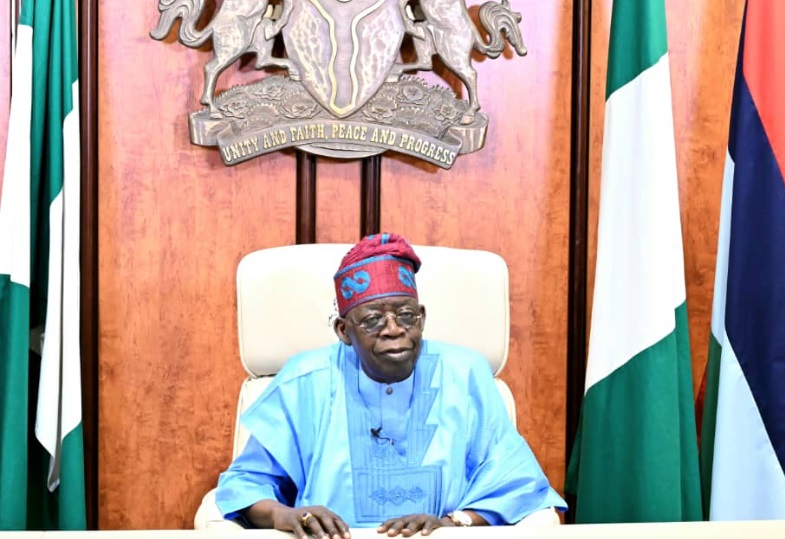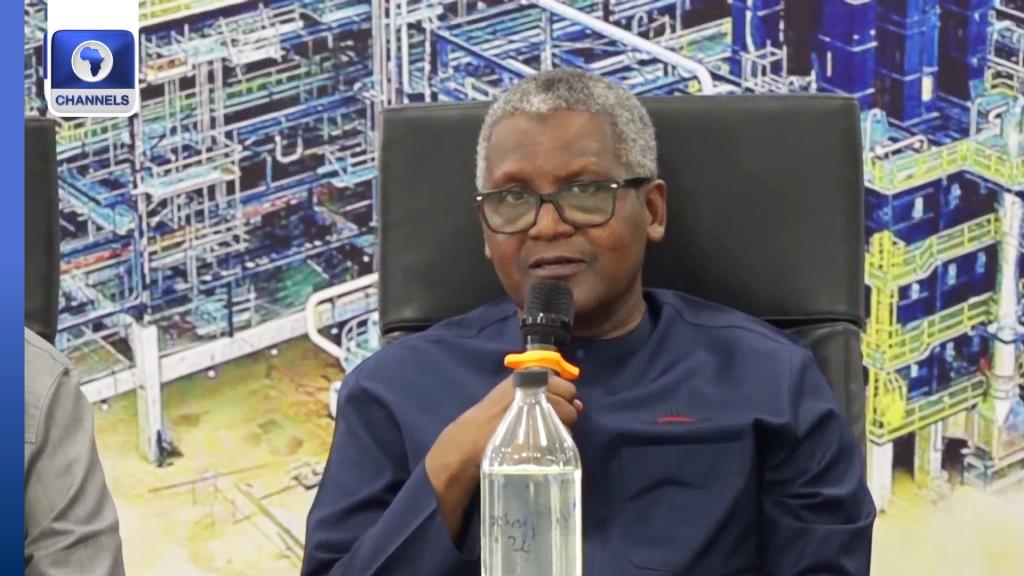Economy
Explainer: Why Nigeria Suspended Fuel Subsidy Removal Before June Deadline?

By Adedapo Adesanya
The National Economic Council (NEC) on Thursday, April 27, suspended the planned removal of subsidy on petroleum products by the end of President Muhammadu Buhari’s administration.
The Minister of Finance, Budget and National Planning, Mrs Zainab Ahmed, made this known to State House correspondents shortly after the valedictory council meeting presided over by Vice President Yemi Osinbajo at the Presidential Villa, Abuja, yesterday.
The Minister stated that the council deliberated on the matter and resolved that the fuel subsidy cannot be removed for now.
The council, however, agreed on the need to continue the discussion on the matter and the necessary preparatory work in conjunction with states and representatives of the incoming administration, she said.
“[The] council agreed that the timing of the removal of fuel subsidy should not be now. But that we should continue with all of the preparatory works that need to be done and that this preparatory has to be done in consultation with the states and other key stakeholders, including representatives of the incoming administration,” she said.
“[The] council agreed that the fuel subsidy must be removed earlier rather than later because it is not sustainable. We cannot afford it anymore. But we have to do it in such a way that the impact of the subsidy is, as much as possible, mitigated on the lives of ordinary Nigerians.
“So, this will require looking at alternatives to the fuel subsidy that needs to be planned for and subsequently put in place. But also what needs to be done to support the people that will be most affected as a result of the removal.”
Mrs Ahmed added that the federal government is working with other institutions of government towards the eventual removal of the fuel subsidy.
“And if I may remind this forum that the budget for 2023 has a provision for fuel subsidy only up to June 2023, and also, the Petroleum Industry Act has a provision that requires that all petroleum products must be deregulated 18 months after the effective date of the PMS removal and that that period is also up to June 2020,” the minister said.
Earlier in January, Mrs Ahmed said that it would be more appropriate for the government to begin the implementation of its fuel subsidy policy in the second quarter of the year.
The Minister noted that the country needs to exit the fuel subsidy regime because it is a very significant contributory factor to revenue loss.
“You can look at it in two ways, the payments made are revenues that would have come to the government but don’t because it is being spent on fuel subsidy.
“Also, where there is not enough revenue to buy the refined petroleum products, we have to borrow to buy the products, so, if we take that out, that is over N3 trillion, it’s a significant relief if we do not incur any more than that number that we projected for 2023,” she said.
The Muhammadu Buhari-led administration had made plans two years ago to remove subsidy which gulped trillions in cost and set a June 2023 deadline.
Economy
LIRS Urges Taxpayers to File Annual Returns Ahead of Deadline

By Modupe Gbadeyanka
All individual taxpayers in Lagos State have been advised to file their annual tax returns ahead of the March 31 deadline.
This appeal was made by the Lagos State Internal Revenue Service (LIRS) in a statement issued by its Head of Corporate Communications, Mrs Monsurat Amasa-Oyelude.
The notice quoted the chairman of LIRS, Mr Ayodele Subair, as saying that timely filing remains both a constitutional and statutory obligation as well as a civic responsibility.
The statutory filing requirement applies to all taxable persons, including self-employed individuals, business owners, professionals, persons in the informal sector, and employees under the Pay-As-You-Earn (PAYE) scheme.
In accordance with Section 24(f) of the 1999 Constitution of the Federal Republic of Nigeria, Sections 13 &14(3) of the Nigeria Tax Administration Act 2025 (NTAA), every individual with taxable income is required to submit a true and correct return of total income from all sources for the preceding year (January 1 to December 31, 2025) within 90 days of the commencement of a new assessment year.
“Filing of annual tax returns is not optional. It is a legal requirement under the Nigeria Tax Administration Act 2025. We encourage all Lagos residents earning taxable income to file early and accurately.
“Early and accurate filing not only ensures full adherence with statutory requirements, but supports effective monitoring and forecasting, which are critical to Lagos State’s fiscal planning and long-term sustainability,” Mr Subair stated.
He further noted that failure to file returns by the statutory deadline attracts administrative penalties, interest, and other enforcement measures as prescribed by law.
To enhance convenience and efficiency, all individual tax returns must be submitted electronically via the LIRS eTax portal at https://etax.lirs.net. The platform enables taxpayers to register, file returns, upload supporting documents, and manage their tax profiles securely from anywhere.
In keeping with global best practices, Mr Subair reiterated that LIRS continues to prioritise digital tax administration and taxpayer support services. He affirmed that the LIRS eTax platform is secure and accessible worldwide. Taxpayers requiring assistance may visit any of the LIRS offices or other channels.
Economy
NNPC Targets 230% LPG Supply Surge to 5MTPA Under Gas Master Plan 2026

By Adedapo Adesanya
The Nigerian National Petroleum Company (NNPC) Limited has said the Gas Master Plan 2026 targets over 230 per cent scale-up of Liquefied Petroleum Gas (LPG) supply from 1.5 million tonnes per annum (MTPA) to 5 MTPA this year.
The Executive Vice President for Gas, Power and New Energy at NNPC, Mr Olalekan Ogunleye, unveiled the strategic direction of the NNPC Gas Master Plan 2026, outlining an aggressive expansion drive to position Nigeria as a regional and global gas powerhouse.
Mr Ogunleye delivered the keynote address at the 2026 Lagos Energy Week, organised by the Society of Petroleum Engineers (SPE), where he detailed plans to accelerate gas development, deepen infrastructure and significantly scale domestic supply.
According to him, the Gas Master Plan targets a scale-up of LPG or cooking gas supply from 1.5 MTPA to 5 MTPA, alongside expanded feedstock for Mini-LNG and Compressed Natural Gas (CNG) projects.
“The NNPC Gas Master Plan 2026 is a blueprint to unlock Nigeria’s vast gas potential and translate it into tangible economic value,” Mr Ogunleye said.
He added that the strategy would also drive exponential growth in Gas-Based Industries, GBIs, strengthening local manufacturing, fertiliser production and power generation.
“Our renewed focus is on turning abundant gas resources into inclusive economic growth and improved quality of life for Nigerians,” he stated.
Mr Ogunleye said the plan aligns with the Federal Government’s Decade of Gas initiative and the presidential production targets of achieving 10 billion cubic feet per day by 2027 and 12 BCF/D by 2030.
Industry leaders at the event, including executives from Chevron Corporation, Esso Exploration and Production Nigeria Limited, Midwestern Oil and Gas Company Limited, Abuja Gas Processing Company and Shell Nigeria Gas, commended the plan and praised Ogunleye’s leadership in driving implementation excellence.
The new blueprint signals NNPC’s determination to anchor Nigeria’s energy transition on gas, leveraging infrastructure expansion and domestic utilisation to consolidate the country’s status as Africa’s largest gas reserve holder.
Economy
Shettima Blames CBN’s FX Intervention for Naira Depreciation

By Adedapo Adesanya
Vice President Kashim Shettima has attributed the Naira’s recent depreciation to the intervention of the Central Bank of Nigeria (CBN) in the foreign exchange (FX) market, stating that the currency could have strengthened to around N1,000 per Dollar within weeks if the apex bank had allowed market forces to prevail.
The local currency has dropped over N8.37 on the Dollar in the last week, as it closed at N1,355.37/$1 on Tuesday at the Nigerian Autonomous Foreign Exchange Market (NAFEM), after it went on a spree late last month and into the early weeks of February.
However, speaking on Tuesday at the Progressive Governors’ Forum (PGF), Renewed Hope Ambassadors Strategic Summit in Abuja, the Nigerian VP said the intervention was to ensure stability.
“In fact, if not for the interventions by the Central Bank of Nigeria yesterday, the 1,000 Naira to a Dollar we are going to attain in weeks, not in months. But for the purpose of market stability, the CBN generously intervened yesterday.
“So, for some of my friends, especially one of our party leaders who takes delight in stockpiling dollars, it is a wake-up call,” the vice president said.
He was alluding to CBN buying US Dollars from the market to slow down the rapid rise of the Naira.
Latest information showed that last week, the apex bank bought about $189.80 million to reduce excess Dollar supply and control how fast the Naira was gaining value.
The move was aimed at preventing foreign portfolio investors from exiting Nigeria’s fixed-income market, as large-scale sell-offs could heighten demand for US Dollars, intensify capital flight, and exert further pressure on the exchange rate.
Amid this, speaking after the 304th meeting of the monetary policy committee (MPC) of the CBN on Tuesday, Governor of the central bank, Mr Yemi Cardoso, said Nigeria’s gross external reserves have risen to $50.45 billion, the highest level in 13 years.
This strengthens the country’s foreign exchange buffers, enhances the apex bank’s capacity to defend the Naira when needed, and boosts investor confidence in the stability of the Nigerian FX market.
-

 Feature/OPED6 years ago
Feature/OPED6 years agoDavos was Different this year
-
Travel/Tourism10 years ago
Lagos Seals Western Lodge Hotel In Ikorodu
-

 Showbiz3 years ago
Showbiz3 years agoEstranged Lover Releases Videos of Empress Njamah Bathing
-

 Banking8 years ago
Banking8 years agoSort Codes of GTBank Branches in Nigeria
-

 Economy3 years ago
Economy3 years agoSubsidy Removal: CNG at N130 Per Litre Cheaper Than Petrol—IPMAN
-

 Banking3 years ago
Banking3 years agoSort Codes of UBA Branches in Nigeria
-

 Banking3 years ago
Banking3 years agoFirst Bank Announces Planned Downtime
-

 Sports3 years ago
Sports3 years agoHighest Paid Nigerian Footballer – How Much Do Nigerian Footballers Earn




















